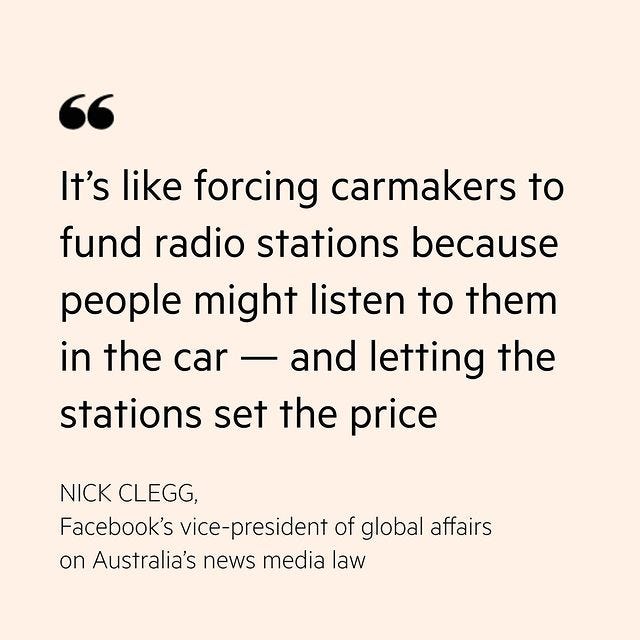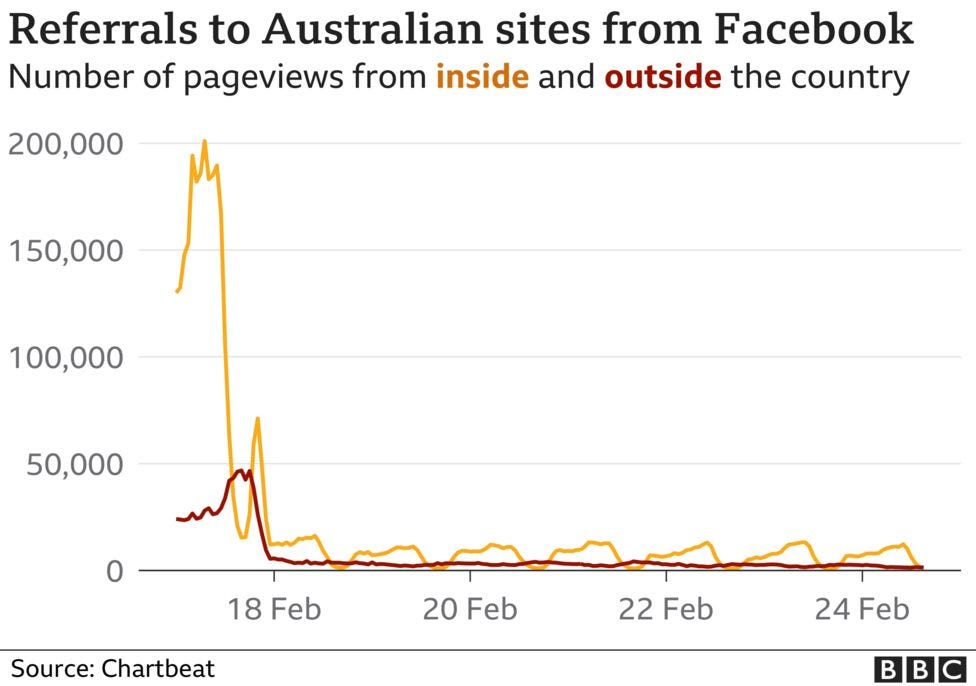The Social Media Report #17
Will Australia's social media news law set a precedent?
In this week’s edition we take a look at the new setup for social networks in Australia, with the social media / news law now passed and agreements struck between Facebook and mainstream media. Will we now see a domino effect in other countries, or will the noted downside ward others off? We also have as usual my must-read articles of the week.
Subscribe below if you’ve been sent this, and you’ll get every edition soon as it’s out.
The week in review
Who won, Facebook or Australia’s regulators? last week’s edition of The Social Media Report took a deep dive into the impending global domino effect of national governments, looking to Australia’s new law on social networks to fund mainstream news, and the wider impact on the social networks. In the last few days, the new law has been passed, and Facebook has stuck a string of deals with Australian media publishers. Facebook does not seem to happy about it, and the Australian Government is claiming this a victory.
“We are entering a new era of technology regulation,” says Amol Rajan, media editor at the BBC. We certainly are. But social networks and media companies exist in symbiosis. One feeds the other with content, and in return gets traffic and brand awareness from billions of people all over the world.
Look at what happens to news media when you ban news on Facebook: I’ve worked inside newspapers and broadcast media. They receive an enormous amount of traffic from social networks. Indeed, many more users of Facebook browse groups and friends’ updates, grazing news for free and with no traffic sent to the news sites themselves (therefore creating little to no revenue for the news outlets) but this is what happened to website traffic in Australia last week:
Not all countries will follow in Australia’s footsteps, but with regulatory reviews impending in the UK, Europe and the U.S., you can see the direction of travel.
Social media and open markets: I look at what’s happening in social media right now as the beginning of a maturing economic market. We will no doubt see some onerous local laws imposed on social networks, in order to fund local interests. But I think we will see the opposite, too. Some nations will maintain open access to information, and as a result innovation in social media will continue to flourish, and as the above data illustrates, access to a larger section of society will benefit many. Law makers need to see the bigger picture, and focus on protecting people, not just media industry tax revenues. Upcoming online harms laws for social media I think will be far more fundamental to the future of the social web.
My must reads from this week
Here are the stories that I have been reading this week.
Facebook's surprising new challengers in audio, video, photos, and text: “The rise of TikTok, Clubhouse, and Substack shows that social networks have gotten competitive again.”
Twitter launches paid content model: Super Follow will be a way of Twitter users charging for some of their content, a model becoming increasingly popular across publishing platforms such as Substack or Patreon, but not yet in any major social network.
Dispo secures funding at $200m valuation: my new favourite app… which has been featured in the NY Times in this feature which is worth a read: “Some are calling Dispo the next Instagram.” Also: great Medium post by Justin Potts on what makes Dispo so special, in case you’ve not heard of it.
Marc Andreesen moderates room planning to troll NY Times journalist Taylor Lorenz: this is a quite disturbing trend of Clubhouse rooms dedicated to discussing an individual, in this case the high profile tech writer Lorenz. It is made all the worse by the discussion being about organised trolling of Lorenz, who regularly covers the issue of trolling and abuse on Clubhouse in the NY Times, and most strikingly, I find it concerning that Marc Andreesen, who is General Partner at a16z, the major investor in Clubhouse, is moderator of the discussion. First time I’ve seen this kind of treatment and a Clubhouse investor involved. This, to me raises a big question for audio social media: if you are moderating a room where harassment is taking place, how do you intervene? Was Marc Andreesen keeping trolls out? Rooms cannot be flagged as harmful or inappropriate, so this is a minefield.
Emails emerge from inside Facebook on state intervention: “Mark/Sheryl … we have received an order from the Turkish government.”
A LONG read on TikTok by Eugene Wei: Andrew Niccol, the screenwriter of The Truman Show, once said, "When you know there is a camera, there is no reality.”
Data
Cision acquires Brandwatch: social media data analytics provider Brandwatch acquired by Cision for $450m.
Earthquakes and internet: Google is sharing data about distortions in light waves passing through its undersea cables with seismologists to help them detect earthquakes.
Social media policy
Facebook’s Oversight Board and the first round of policy changes: Facebook has officially responded to its independent Oversight Board's recommendation on the first 17 cases, committing to action on 11 of them, mainly about making its rules more clear.
Facebook: Myanmar military banned from Facebook and Instagram with immediate effect.
Emails show how Facebook responds to requests by authoritarian governments to censor content, as happened in Turkey during its military offensive against Kurds.
My interview with PR Week about social media and regulation is up online.
Disinformation
Political disinformation on TikTok: TikTok says it removed over 300,000 videos in the US for election misinformation in the second half of 2020, in addition to 441,000 videos from the TikTok For You Page.
Social networks used to raise funds for terror: report on how social media platforms are struggling to handle ISIS-related fundraising campaigns.
Work
Why Zoom fatigue is a thing - major study by Stanford: “For decades, scholars have predicted that videoconference technology will disrupt the practice of commuting daily to and from work and will change the way people socialize.” Four factors are key, according to this research: having colleagues so close up all the time, the cognitive load of constant meetings, the ‘all day mirror’ and reduced mobility.
The Social Media Report is written by Drew Benvie, founder & CEO of Battenhall, The Drum, CIPR and GDXA’s social media consultancy of the year 2020.
You can follow The Social Media Report on Twitter at @TheSMReport. Suggestions for stories can be emailed to db@battenhall.com. Thank you for reading, and see you next time.



